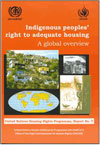Report on the right to adequate housing of Indigenous Peoples
Issued by
Special Rapporteur on the rights of Indigenous Peoples
Published
17 July 2019
Issued by
Special Rapporteur on the rights of Indigenous Peoples
Published
17 July 2019
Issued by Special Procedures
Subjects
Adequate housing, Indigenous Peoples
Symbol Number
A/74/183
Summary
This report finds that housing conditions for indigenous peoples around the world are overwhelmingly abhorrent and too often violate the right to adequate housing, depriving them of their right to live in security and dignity.
This report finds that housing conditions for indigenous peoples around the world are overwhelmingly abhorrent and too often violate the right to adequate housing, depriving them of their right to live in security and dignity.
Indigenous peoples face significant barriers to their enjoyment of the right to housing compared with non-indigenous peoples. They are more likely to:
When they defend their rights, they are often the targets of extreme violence.
The report contains guidance for States, indigenous authorities and other actors on how to ensure that their obligations under international human rights law regarding the right to housing are met in conformity with the United Nations Declaration on the Rights of Indigenous Peoples.
The report asserts that the right to housing of indigenous peoples must be interpreted in a manner that recognizes the interdependence and indivisibility of the right to housing as articulated in international human rights law and the United Nations Declaration on the Rights of Indigenous Peoples. The meaning and application of the right to housing must therefore integrate:
The Special Rapporteur argues that the adequacy of housing must be defined and determined by indigenous peoples themselves. She also asserts that human rights claims framed using the Declaration will be strengthened if the accountability mechanisms and the legal obligations attached to the right to housing are deployed. She concludes with a set of recommendations to guide States, indigenous authorities and other actors in ensuring that indigenous peoples can live in peace, security and dignity and enjoy the right to adequate housing without discrimination.
Read the report in all six UN languages.
 Indigenous peoples’ right to adequate housing – a global overview (2005)
Indigenous peoples’ right to adequate housing – a global overview (2005)
This report by OHCHR and UN Habitat looks at whether and to what extend indigenous peoples in different regions of the world enjoy the right to adequate housing. It includes seven case studies on the status of housing for indigenous peoples, and identifies strategies to help improve their living conditions worldwide. PDF in English
 UN Habitat – Securing land rights for indigenous peoples in cities (2011)
UN Habitat – Securing land rights for indigenous peoples in cities (2011)
In developing the report the Special Rapporteur invited States, Indigenous Authorities, international and regional organizations, national judicial institutions, National Human Rights Institutions, Indigenous Peoples’ and civil society organizations, and other stakeholders to share relevant information.
States
Indigenous Peoples and Civil Society Organizations